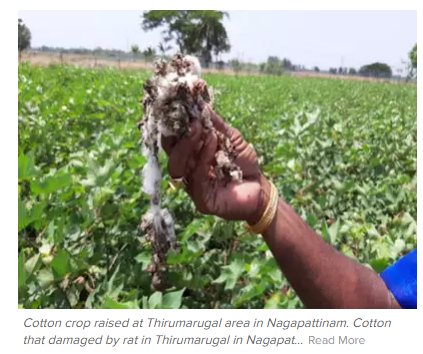That furry little blur you just saw zip across in front of your farm? Those brown, rice-shaped droppings behind the stored grains? O.K, how much trouble can a couple of rodents be?
The problem with rodents and insects/termites sharing the crop harvest is probably as old as the culture of agriculture. Each rat on a farm will eat, spoil or damage approximate $25 worth of grain per year. So, stop being a rodent’s landlord!! Rodents and insects have been a problem on farms where food and nesting sites are plentiful. These pests consume and contaminate food destined for livestock and other animals, as well as humans. Rodents also serve as vectors or reservoirs of a variety of disease such as leptospirosis, salmonellosis and murine typhus that are transmittable to humans.
Taking food from our table
More than 90% of world’s rice is produced in Asia. Rodents and insect pests cause losses to production up to 5-10% per annum. In Asia alone, the rice loss every year caused by rodents could feed about 200 million people. Damage to crops in Africa and South America is equally dramatic.
COTTON FARMERS WORRY AS RODENTS DESTROY THEIR CROPS
D Vincent Arockiaraj | TNN | May 12, 2019

NAGAPATTINAM: Voracious rodents have raided hundreds of acres of cotton crops in Thirumarugal of Nagapattinam district, causing extensive damage to farmers who lamented the loss could amount to lakhs of rupees.
Worried farmers’ unions said that the rodents, if left uncontrolled, could wreak further havoc to their remaining crops, and requested to the agriculture department to extend a helping hand to curb the infestation and announce monetary help.
Farmers in Perunattrangudi, Thennamarakudi, Thirukannapuram, and Thiruchettangudi have raised cotton on 600 acres, with expectation of high yield and better profit. This time, however, their hopes were dealt a crushing blow, after the rodents began raiding their lands.
FALL ARMYWORM INVADES CROPS ACROSS ASIA, SMALL FARMERS WORST HIT
Reuters BAN NONG TOR | June 20, 2019

Looking out at his empty, red-earth field, Thai farmer Puang Timdon said his two-week-old maize crop didn’t stand a chance against the fall armyworm pest.
“All the 8 rai (1.28 hectare) I planted were all heavily infested,” said the 42-year-old from his farm in Ban Nong Tor town in Pak Chong district, 180 km (120 miles) northeast of the capital Bangkok.“The worm ate the whole field in three days, leaving so much damage that it wasn’t worth saving.”
Fall armyworm, a caterpillar that got the name because it invades crop lands in droves, much like an army, has rapidly spread across Asia since it was detected in southern India late last year. Fields in Bangladesh, Myanmar, Vietnam, Indonesia and Taiwan have fallen victim. In Thailand, it has badly affected the country’s corn crop, much of which is sold to the animal feed industry.
TO INCREASE THE YEILD

Farmers worldwide are leaving no stone unturned to increase the yield of crops. The adaptability and agility of the pests make getting rid of them particularly impossible. Given the threats to the agricultural world from rodents and insects, farmers started using plastic agricultural films to increase the yield and at the same time, the films act as a barrier from pests. Agricultural films have been laid on a range of crops during or after planting as a way of retaining moisture and acting as a form of the greenhouse to improve plant growth. But it’s a proven fact that using agricultural films doesn’t solve the rodent/pests problem. Major constraints to banana production, a dietary staple for over 70 million people in sub-Saharan Africa are pest infestations and poor nutrition. Although mulch can improve soil water and nutrient status it also promotes the proliferation of banana weevil, one of the most serious banana pests. To protect crops from rodents and pests cases have been recorded where people have become so desperate that they have caused permanent environmental disruption where they have dynamited caverns, burnt down forests, adjacent to their fields or they have resorted to lethal rodent control devices that have killed humans or abandoned the otherwise productive area.
Currently, only toxic rodenticides are used which should be curbed as soon as possible. Being toxic in nature they come with a set of liabilities. Thus, there is a need for an innovative, eco-friendly and non-toxic solution to get rid of pests and rodents problems.
Do you have difficulty in finding a solution to pest’s problem on your farm? Well, wait no more! There is now a solution well developed to aid your needs in getting rid of rodents and pests in your fields. Employing innovative masterbatch formulation techniques on agricultural films and focusing on environmental norms is the need of the hour. RodrepelTM, TermirepelTM, Combirepel™, are non-toxic and non-hazardous patented solutions developed by C Tech Corporation, has been successful in keeping away rodents, termites/insects from plastic materials in a non-toxic and non-hazardous way. These products do not kill pests but only repels them using its sensory mechanism. Our products are compliant with ROHS1, ROHS2, ROHS3, REACH and are FIFRA exempted. Unlike conventional pesticides, these products are developed in a special manufacturing process that provides high-temperature stability up to the highest polymer processing temperatures. Thus, RodrepelTM, TermirepelTM, Combirepel™ can be extruded on an extruder at elevated temperature making them ideal masterbatches suited for polymeric applications. The products act through a series of highly developed mechanisms that ensure insects and rodents are kept away from the target application. These product masterbatches are compatible with all types of thermosetting and thermoplastic polymer. The masterbatches can also be customized depending upon the target, application, region, and so on.
Contact us at technical.marketing@ctechcorporation.com if you’re facing problems with rodents and get the best remedies to combat this menace.
Also, visit our websites:
http://www.ctechcorporation.com/
http://www.rodrepel.com/
http://www.termirepel.com/
http://www.combirepel.com/
Follow our Facebook pages at:
1] https://www.facebook.com/Combirepel-411710912249274/
2] https://www.facebook.com/Termirepel-104225413091251/
3] https://www.facebook.com/Rodrepel-120734974768048/
Follow us on our Twitter pages at:
1] https://twitter.com/rodrepel
2] https://twitter.com/termirepel
3] https://twitter.com/combirepel
